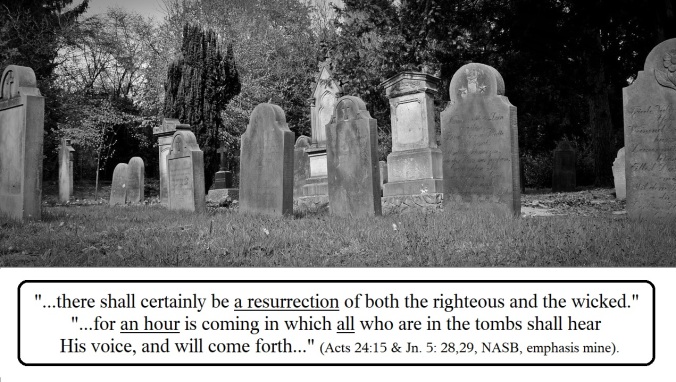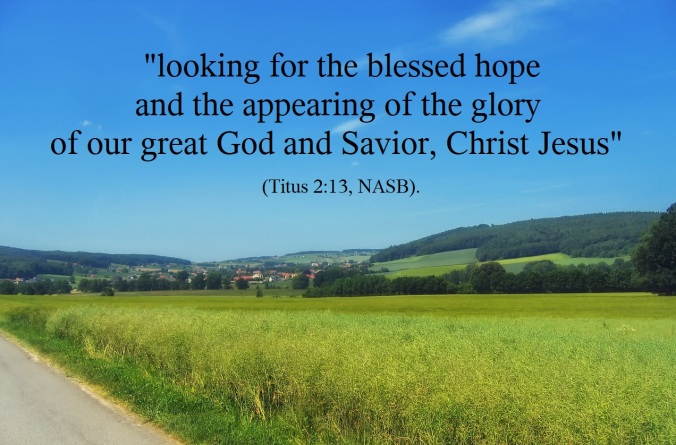“Go therefore and make disciples of all the nations…teaching them to observe all that I commanded you; and lo, I am with you always, even to the end of the age” (Matthew 28:19-20, NASB).
——————–
Contents:
1) Premillennial Concepts Refuted by the Bible (Tom Edwards)
——————–

-1-
Premillennial Concepts Refuted by the Bible
Tom Edwards
In seeing what the Bible says about the kingdom having already come (Mark 9:1; Col. 1:13), Jesus already reigning over it (Acts 2:29-36; Eph. 1:20-23), and the universal resurrection for all on the “last day” (Jn. 5:28-29), we are also seeing how the Bible today disproves popular and particular beliefs concerning Premillennialism.
For Premillennialism teaches that as we near the second coming of Christ, it will be preceded by a “rapture” that will take place at the beginning of the 7-year Great Tribulation (though some premillennialists teach that the rapture will occur during the middle of that time; while others, at a time closer to the end of that 7-year period). In the rapture, according to the theory, all the Christians living and deceased will be snatched up to meet Christ in the air.
Though we might normally think of this word “rapture,” which is actually not used anywhere in the Bible, to mean “ecstatic joy or delight,” as Webster defines its primary definition, yet he also gives lastly its archaic meaning as “the act of carrying off.” It stems from Middle French, from about A.D. 1600.
But how and when did its premillennial meaning, with all that pertains to it, come about? The doctrine of the pre-tribulation rapture is said, by various authors, to have begun in the 18th century by two Puritan preachers by the name of Increase Mather and his son Cotton; and was popularized in the 1830s by John Darby and the Plymouth Brethren; and eventually gained popularity in the U.S. in the early 20th century through the widely used Scofield Reference Bible (Wikipedia).
It appears that this idea of just the Christians being in the rapture is based on 1 Thessalonians 4:16-17, which speaks of the Lord’s return when “the dead in Christ will rise first. Then we who are alive and remain will be caught up together with them in the clouds to meet the Lord in the air, and so we shall always be with the Lord.” This is how Paul, by divine inspiration, had answered the Thessalonians’ concern about their loved ones who had passed away as Christians. So that is why his focus is on just them, instead of everyone in general. He even concluded the thought, by saying, “Therefore comfort one another with these words” (v. 18). Yes, the believers can have comfort when their loved ones pass away as Christians, knowing that their spirits have not only gone to a better place, but that they will also be resurrected and caught up first when the Lord returns, and then immediately followed by those Christians still living at that time! The Greek word for “caught” (harpazo) in verse 17, in the phrase “caught up together,” means “to snatch out or away” (Thayer’s third definition). So though that is the archaic meaning of “rapture,” yet it has no reference to the premillennial rapture theory.
Concerning that time when the dead in Christ and the living Christians will be caught up together to meet the Lord in the air, that will also be the same time when all people – regardless of whether they are saved or lost — will be caught up. For as we saw recently, that will all happen for the righteous and the unrighteous within the same “hour” (Jn. 5:28-29) on that “last day” and regardless of how long one has been deceased (Jn. 6:39-40; 12:48).
If there were to be a rapture, followed by seven years of the Great Tribulation, which would end by the Lord’s second coming, then what would virtually anyone be able to do – and without the use of even a calculator? For those who missed the rapture, they would then be able to easily pinpoint the day that Christ would return by merely adding 7 years to the date of the rapture! But what does the Bible say? It shows that when the Lord comes again, it will be “like a thief in the night” (1 Thess. 5:2). In other words, He will come unexpectedly. Yet, through the years, many folks have predicted what they believed to be the exact time of His return — which turned out to be incorrect. It would seem they have either not read the Scriptures concerning this or have disregarded it.
This might answer a question that has arisen while reading up to this point: As you might have also guessed, the premillennialist doesn’t view Christ coming back for the Christians in the rapture as His second coming. They just want to call it the “Rapture” and have His second coming later on.
But another thing the Premillennial view makes more of — than what the Bible teaches — is on the resurrection. For instead of there being just one universal resurrection (as cited above), they have 1) a resurrection of the deceased Christians for the rapture; 2) a resurrection at the end of that 7-year period for those who had become Christians during that Great Tribulation, but also had died during that time; and, included with them, all the saved people of the Old Testament Times; and 3) a resurrection at the end of the Lord’s 1,000-year reign on earth that will be for all the lost souls of all time. So, according to this view, there is not one, nor not two, but three resurrections yet to come! And note, too, that there will be 1,007 years between the first resurrection and the third! That sure doesn’t sound like the “hour” of which Jesus said all would be raised – the saved and the lost (Jn. 5:28,29; Acts 24:15)!
Concerning the idea that the future Great Tribulation will be the worst time this world has ever known, Jesus had said that about the time pertaining to the destruction of Jerusalem in A.D. 70: “For then there will be a great tribulation, such as has not occurred since the beginning of the world until now, nor ever will” (Matt. 24:21). He then spoke more concerning that time and also pointed out the nearness of it, by saying, “…this generation shall not pass away until all these things take place” (v. 34).
Some believe that during that 7-year Great Tribulation it will also be a time of the greatest work of evangelism ever carried out. In his book, The Late Great Planet Earth, Hal Linsday, a premillennialist, writes, “After the Christians are gone, God is going to reveal Himself in a special way to 144,000 physical, literal Jews, who are going to believe with a vengeance that Jesus is the Messiah.” These will evangelize, and “…the earth will never know a period of evangelism like this period” (p. 110).
It will be at the end of that 7-year tribulation that Jesus will return, according to the Premillennial belief. He will then fight His enemies in the battle of Armageddon and defeat them. It will also be at that time when He will establish His kingdom on earth and sit on the throne of David to rule for a thousand years from here on earth.
As we have seen, however, Jesus is already sitting on the throne of David and ruling over the kingdom (cf. Luke 1:31-33; Acts 2:29-36; Dan. 7:13-14). And, note, too, the prophecy concerning this in 2 Sam. 7:12-16. Though this prophecy has a dual fulfillment in pertaining to Solomon as well as to Christ, it is in Acts 2:29-36 that we see that it was to the Christ that David had looked to be the ultimate fulfiller of it. The prophecy states: “When your days are complete and you lie down with your fathers, I will raise up your descendant after you, who will come forth from you, and I will establish his kingdom. He shall build a house for My name, and I will establish the throne of his kingdom forever. I will be a father to him and he will be a son to Me; when he commits iniquity, I will correct him with the rod of men and the strokes of the sons of men, but My lovingkindness shall not depart from him, as I took it away from Saul, whom I removed from before you. Your house and your kingdom shall endure before Me forever; your throne shall be established for ever.”
With that prophecy in mind, now notice Acts 2:29-36: “Brethren, I may confidently say to you regarding the patriarch David that he both died and was buried, and his tomb is with us to this day. And so, because he was a prophet and knew that GOD HAD SWORN TO HIM WITH AN OATH TO SEAT one OF HIS DESCENDANTS ON HIS THRONE, he looked ahead and spoke of the resurrection of the Christ, that HE WAS NEITHER ABANDONED TO HADES, NOR DID His flesh SUFFER DECAY. This Jesus God raised up again, to which we are all witnesses. Therefore having been exalted to the right hand of God, and having received from the Father the promise of the Holy Spirit, He has poured forth this which you both see and hear. For it was not David who ascended into heaven, but he himself says, ‘THE LORD SAID TO MY LORD, “SIT AT MY RIGHT HAND, UNTIL I MAKE YOUR ENEMIES A FOOTSTOOL FOR YOUR FEET.”‘ Therefore let all the house of Israel know for certain that God has made Him both Lord and Christ — this Jesus whom you crucified.”
So Jesus who built the church (Matt. 16:18), which is also referred to as “the house of God” (1 Tim. 3:15) and the Lord’s “kingdom” (Col. 1:13), is now ruling over that (Eph. 1:20-23). For “…God has made Him both Lord and Christ…” (Acts 2:36), which indicates that Jesus is an “anointed ruler,” since “Christ” literally means “anointed”; and “Lord” can mean “ruler.” So the promise that God the Father would give Jesus “the throne of His Father David” (Luke 1:32) has been fulfilled. And going along with that, to help you understand it better, David’s throne is sometimes referred to as “the throne of the LORD.” For Solomon “sat on the throne of David his father” (1 Kings 2:12), yet it is also said that “Solomon sat on the throne of the LORD as king instead of David his father” (1 Chron. 29:23). It is called “the throne of the LORD” because God had anointed David to reign as king over the Lord’s people and do so as the Lord instructed. Solomon was then to continue in that when he succeeded his father to the throne. And how perfectly Jesus Christ is now doing so! Therefore, Jesus being on the throne of David is not talking about a literal, physical throne, which the Lord would have to sit upon here on earth; but, rather, just as it was to be God’s rule through David and Solomon as they reigned over His people, it is God’s rule now through Jesus Christ, God’s anointed, who is not just a king of a kingdom, but also “a King of kings and Lord of lords” (Rev. 19:16) who rules over all (with the exception of God the Father)!
We considered earlier that at Christ’s second coming, according to the Premillennial view, the Lord will put an end to the Great Tribulation; will raise all the Old Testament saints from the dead and those who had become Christians during the Great Tribulation and died; that the Lord will defeat His enemies in the Battle of Armageddon and set up His kingdom on earth where He will reign over it for a thousand years. But what did we just read in 2 Samuel 7:12 concerning the time that God would set up His kingdom? The Lord told David, “When your days are complete and you lie down with your fathers…” In other words, when David was deceased, all this was to happen. But the Premillennial view has David resurrected and alive when God would set up His kingdom on earth.
Think, too, about Christ having to come back to earth to literally dwell on it again, sitting on a physical throne in Jerusalem, as the Premillennial view teaches. Would this not be some type of demotion for the Lord – rather than an exaltation to a glorious position?! But where He is right now at the right hand of God, having all authority and power in heaven and earth (Matt. 28:18), having been given “dominion, Glory, and a kingdom, That all the peoples, nations and men of every language Might serve Him…” (Dan. 7:14), being exalted over all creation (cf. Col. 1:15-18), and having all things in subjection to Him with the exception of the Father (1 Cor. 15:27), how could Jesus ever have more dominion, be more glorified, or be more exalted than that?! Nothing can top what He already has!
Let us be sure that the religious doctrines we believe and follow are of God and not merely of men.
(All Scripture from the NASB.)
——————–
The Steps That Lead to Eternal Salvation
1) Hear the gospel, for that is how faith comes (Rom. 10:17; John 20:30,31).
2) Believe in the deity of Christ (John 8:24; John 3:18).
3) Repent of sins (Luke 13:5; Acts 17:30).
4) Confess faith in Christ (Rom. 10:9,10; Acts 8:36-38).
5) Be baptized in water for the remission of sins (Mark 16:16; Acts 2:38; 22:16; Rom. 6:3,4; Gal. 3:26,27; 1 Pet. 3:21).
6) Continue in the faith, living for the Lord; for, if not, salvation can be lost (Heb. 10:36-39; Rev. 2:10; 2 Pet. 2:20-22).
——————–
Tebeau Street
CHURCH OF CHRIST
1402 Tebeau Street, Waycross, GA 31501
Sunday services: 9:00 a.m. (Bible class); 10 a.m. & 5 p.m. (worship)
Wednesday: 7 p.m. (Bible class)
evangelist/editor: Tom Edwards (912) 281-9917
Tom@ThomasTEdwards.com
http://thomastedwards.com/go (Older version of Gospel Observer website without pictures, but back to March 1990)
http://tebeaustreetchurchofchrist.org/
http://ThomasTEdwards.com/audioser.html (audio sermons)


